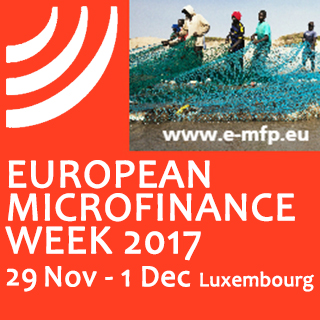During the closing day of European Microfinance Week , Imran Matin of the US-based nonprofit Innovations for Poverty Action (IPA) stressed the importance of not just whether women will use financial services, but “what account ownership will translate into in terms of achievement.” Foreshadowing a theme of the session, he added that “intra-household dynamics is very important and also particularly difficult to measure.”
, Imran Matin of the US-based nonprofit Innovations for Poverty Action (IPA) stressed the importance of not just whether women will use financial services, but “what account ownership will translate into in terms of achievement.” Foreshadowing a theme of the session, he added that “intra-household dynamics is very important and also particularly difficult to measure.”
Bdour Al-Hyari of Jordan’s Microfund for Women (MFW) described a long-running insurance product offered by her microfinance institution (MFI). The coverage provides cash to clients who are hospitalized or have a family member who is. While health issues were a major cause of default in the past, women who got “hospital cash” from MFW reportedly repaid their loans at a rate of 100 percent. Moreover, Ms Al-Hyari described the “cognitive change” that the women experienced. Ten years ago, the women often wanted a refund after not needing the benefit for a significant period of time. Now, she said, they understand that their neighbor benefits from the money they spent even if they don’t benefit personally.
Mr Matin then described a randomized control trial on a commitment savings product in the Philippines. Thirty months after the introduction of the product, users had increased their savings as well as purchases of durable goods. The effects were even stronger for women who started in positions of lower bargaining power.
Bobbi Gray of the US-based Grameen Foundation described an example in Burkina Faso in which researchers found that women’s caregiving responsibilities only allowed them to spend two hours per day on the enterprises for which they had borrowed money. She said that this means we should adjust our expectations of business outcomes. That is, we can’t always expect women to earn the payback that you would estimate based on 8-hour workdays.
Anna Zanghi of US-based Mastercard referred to the “Mastercard Index of Women Entrepreneurs 2017,” which she said shows that “young consumers’ approach to credit is completely different than previous generations.” For example, “young people don’t want revolving credit. They want money quickly, but they want to know what they are getting into.” Ms Zanghi added that financial technology firms (fintechs) are responding to this demand by offering credit at retailers (at the “point of need”), which “requires credit decisions to be made in a different way.”
Reflecting another theme of the session, Mr Matin argued that “we need to pay much better attention to heterogeneity.” As evidence, he cited a project that “found men’s enterprise up and women’s down” as the result of a particular intervention. However, upon investigating “disaggregated numbers, women’s [entrepreneurial efforts] were down when mixed with men’s in same household, but up when no men’s enterprise existed in the home.”
Ms Gray then offered another example from Burkina Faso. When linking banks with women’s savings groups, program staff got pushback from men. In response, the organization began offering the same services separately to both men’s and women’s groups. Ms Gray described this as taking on clients’ partners’ concerns rather than seeking to bypass them. Regarding serving men as well as women, she said, “My dream project is [working with] men and women that have goals that are in conflict [and seeing if we] can sit down together to meet both [sets of goals] to serve the household as a whole.”
Continuing a step further regarding the viability of of working with men on women’s issues, Ms Gray described a project in Benin in which her team was surprised at men’s openness to discussing family planning. The men said, approximately, “We knew our wives were sneaking out to get contraception.”
This interview concludes a sponsored series on European Microfinance Week, which was held in Luxembourg from November 29 through December 1. MicroCapital was engaged to promote and cover the event on-site.
Sources and Additional Resources
European Microfinance Week 2017
http://www.e-mfp.eu/european-microfinance-week-2017/information
MicroCapital Coverage of European Microfinance Week Since 2012
https://www.microcapital.org/category/european-microfinance-week/
Similar Posts:
- SPECIAL REPORT: Financial Inclusion for Women Requires Engaging All Levels of the Microfinance Institution
- SPECIAL REPORT: Increasing Financial Access for Women with Better Data, Mentoring, Staff Training, “Gender-smart” Audits
- SPECIAL REPORT: European Microfinance Week Is Almost Here!
- SPECIAL REPORT: Saluting MFI Staff, Promoting Flexible Products, “Keeping the Client at the Heart” as European Microfinance Week Closes
- SPECIAL REPORT: Banco FIE of Bolivia Takes $100k “Financial Inclusion that Works for Women” European Microfinance Award 2022
